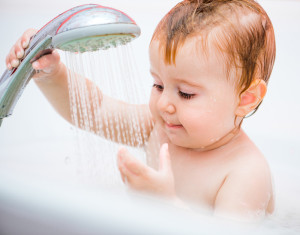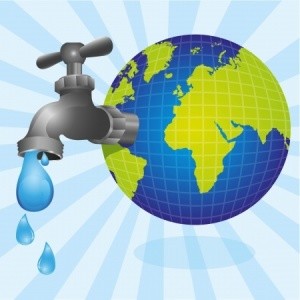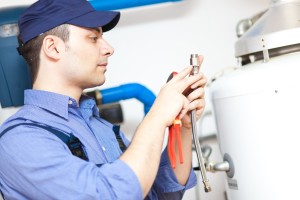Plumbing
Why You Should Switch to a Natural Gas Grill.
 How many times has the following exchange occurred in your home?
How many times has the following exchange occurred in your home?
“You remember that we’re having company this weekend, right?”
“Yeah, so…”
“So, like I’ve been asking you for the past 3 months, you need to either fill up the propane tank or, even better, get us a fully filled back-up.”
“And when exactly did that become my job?!”
Sound familiar? Then you’re a perfect candidate to give up on the propane and switch a natural gas fired outdoor grill.
Natural gas is a cleaner burning fuel than propane, which means that the pipes and connections are going to be easier to clean, and won’t need to be cleaned as often.
Plus, you’re not going to run out of natural gas, because your grill (like your home) would be connected to the gas main on your street. With natural gas, you simply turn on your grill and, no matter how much cooking you have planned, you’ll have all the gas you need.
At Boden Plumbing, Heating & Air, we’re licensed plumbers and gas fitters. That’s means we are fully qualified, experienced, and trained not just to install a natural gas hook-up on your deck or patio, etc., but to do so to the highest standards of industry safety and excellence.
So if you’re tired of squabbling over propane, maybe it’s time to go all natural – with a natural gas connection from Boden.
How to Prevent Water Pipes from Leaking
When water flows to the wrong place at the wrong time – as it would from a cracked or leaking pipe – it can cause extensive damage to your home and personal belongings. Even a slow drip behind a bathroom or kitchen cabinet can cause sheetrock and wood floors to rot while eventually making its way to the level below.
And since damaged water pipes come in all shapes and sizes, it’s important to understand what can cause a pipe to crack or burst and what measures you, as a homeowner, can take to prevent that from happening.
 Frozen Pipes
Frozen Pipes
An un-insulated pipe that is exposed to below freezing temperatures can freeze, burst, and instantly start gushing water. That can happen in your garage, a crawl space, or in any other unheated space. To prevent pipes from freezing, disconnect outdoor hoses and drain the faucets. Shut off and drain your irrigation system for the winter. And make sure all pipes located in unheated spaces are insulated.
- Leaky Pipes
Minor pinholes in your water pipes can’t fix themselves, but they can grow and become even more problematic. It’s okay to tape it up as a short-term measure, but don’t way too long before implementing a more permanent solution, even if all or a portion of water pipe needs to be replaced.
- Unattended Drain Clogs
If a clogged drain is left to sit, it can cause water pressure to increase in that same pipe. Over time, the added pressure can cause the pipe to crack.
- Corroded Pipes
The older a home and it’s plumbing, the more prone metal pipes become to internal corrosion. Constant exposure to soil, water, and temperature fluctuations can do a number on them, so you’ll want to baby them as much as possible for added years of service. Start by switching from chemical to green drain cleaning liquids.
At Boden Plumbing, Heating, & Air, we offer professional pipe repair and replacement services. Same goes for water pipe insulation, sewer and drain cleaning, and any other home plumbing need you might have. We do the job right the first time, and we guarantee your 100% satisfaction. Contact us today for service, and put our experience to work for you.
Why Are My Pipes Banging?
Your plumbing is capable of such a variety of sounds and from all kinds of sources and for all kinds of reasons, it’s enough to drive a grown home owner crazy. Those most likely to be driven crazy by the cacophonous symphony, however, are those who ignore the sounds hoping they’ll just go away.
We are here to tell you that, under most circumstances, when your plumbing starts making noises, it most assuredly is trying to tell you something, and usually that something is “Fix me!” Which means ignoring the noises is exactly the wrong thing to do if you truly want them to cease and desist.
 One unpleasant plumbing-related sound can best be described as a loud banging noise coming from your pipes. This is known to the plumbing community as “water hammer” and, if you’ve ever heard it, you know exactly why.
One unpleasant plumbing-related sound can best be described as a loud banging noise coming from your pipes. This is known to the plumbing community as “water hammer” and, if you’ve ever heard it, you know exactly why.
The most common form of water hammer comes from a faucet being turned on or shut off, although the sharp banging noise can come from any of your pipes. Water hammer also produces a ticking sound that frequently can be heard all over your house.
The point is, if you ever hear any odd noises that you suspect or know are coming from your plumbing, contact Boden Plumbing right away. Ignoring it could lead to one or more burst pipes and water damage to your home. Water hammer also can damage appliances, including your fridge, dishwasher, and water heater.
Instead, we’ll come out to your house, diagnose the symptoms, locate the cause of the problem, and then give you a guaranteed upfront price to get it fixed. And all with our 100% satisfaction guaranteed. We also can offer you solutions for avoiding water hammer in the future.
Why You Should Have Your Water Heater Inspected
 With some things in life, timing is everything. Other times, timing just doesn’t matter.
With some things in life, timing is everything. Other times, timing just doesn’t matter.
If a local radio station is giving away $10,000 to the “100th lucky caller,” for example, being 99th just won’t cut it. Or, take applying for your first job right out of college. You could have the world’s best resume, but unless you apply somewhere that needs what you bring to the table right then and there, your search will probably need to continue.
Okay, so how about when timing really makes no difference at all? Well, scheduling a water heater performance and safety inspection definitely falls into that category. That’s especially true if you have a gas water heater and it hasn’t been professionally inspected in at least a year.
Here’s the logic behind “any time scheduling”:
- Your water heater is designed, on average, to last 10 -12 years. In the overall scheme of things, that’s not a very long time. So while you have it, doesn’t it make sense to give it the best care possible?
- Water heater storage tanks are prone to interior corrosion over time, especially if you have hard or acidic water. Corroded water can bring about internal cracks, and cracks can lead to gas and carbon monoxide leaks.
- During a water heater inspection, your professional Boden plumber will also check your thermostat to make sure your water is hot enough without the risk of scalding.
- Is your water heater insulated? You might want to consider getting that done, too, as it can cut your water heating costs by about 9%.
- We’ll also check your sacrificial anode, a device used to help prevent internal corrosion. By replacing it at proper intervals, we can help extend the lifespan of your system.
These are just a few examples of what goes into a water heater performance and safety inspection by Boden. To help better protect your investment, home, and family, we encourage you to contact us to schedule service today.
Vacation Plumbing Tips You Shouldn’t Ignore
 Your home’s plumbing can be easily overlooked when you leave your house unoccupied for a period of time. If something goes wrong while you’re away, your vacation memories can easily turn into living nightmares.
Your home’s plumbing can be easily overlooked when you leave your house unoccupied for a period of time. If something goes wrong while you’re away, your vacation memories can easily turn into living nightmares.
Unattended plumbing is just one of the reasons why homes are ten times more likely to be damaged by water than fire.
So, to make sure your home doesn’t become part of that statistic, here are five simple plumbing tips that will ensure you don’t return to a watery mess.
- Turn off the main shut-off valve to your plumbing system. If you can’t turn off the main valve, shut off individual valves under sinks, behind toilets, your refrigerator and the washing machine.
- It’s always a good idea to turn off your water heater before going on vacation. All water heaters have a shut off water valve attached to the tank. Turning it to the off position could prevent a big water spill, the kind that can result from a tank fail during your absence. Turning the heater down or off is another good idea. Why heat water when not home?
- Add some water and a drain maintenance product to your drains before you leave. This will keep them semi-wet and prevent them from developing an unpleasant odor.
- Do a visual inspection of all appliances that have plumbing (refrigerator, washing machine, hot water heater) to make sure nothing is wet or corroded.
- Have someone come to your house while you’re gone and walk around – inside and out – to keep an eye out for water leaks and other signs of trouble.
Has it been a more since you’ve had a whole-house plumbing inspection? Then scheduling one before vacation will allow you to enjoy your time away with greater peace of mind. If nothing’s wrong, you’ll know that for sure. And if there’s an item or two should require further attention, the professionals at Boden will advise you whether immediate attention is required or if the issue can wait until you return. Safe travels this summer or anytime at all.
Backyard Plumbing Solutions in Kenwood and Napa
When most people think of plumbing, they think of toilets, sinks, and showers – all of which reside inside their home. But did you know that plumbing can be used in a variety of ways to enhance your backyard experience, as well?
From the practical to the deluxe, here are some backyard plumbing solutions that can add a splash of modern luxury to your backyard retreat.
- Rinse off the sand, chlorine, or simply the sweat in an outdoor shower. Add a lower hand-held shower head so you can give Fido a refreshing rinse as well.
 Relax to the soothing sounds of flowing water and help drown out the sound of traffic with an outdoor fountain.
Relax to the soothing sounds of flowing water and help drown out the sound of traffic with an outdoor fountain.
- Add a garden sink to help make watering your plants and flowers and washing your gardening tools a breeze.
- Tired of dragging your garden hose from one area of your yard to another? An outdoor tap – or two – in a more convenient location can help solve that problem.
- Save yourself the hassle of running in and out of the house every time you or your kids need a drink of water by having a drinking fountain installed in your backyard.
- No one wants to be stuck indoors cooking on a beautiful day. An outdoor kitchen, complete with a mini fridge, wet bar, and bar-b-q can be the perfect place to entertain all summer long. And, with a few well-placed portable heaters for good measure, you can extend your backyard experience by leaps and bounds.
Here at Boden, we’re skilled and experienced residential plumbers with creative solutions for indoors and outdoors. Contact us today, tell us the need you’re trying to fill, and we’ll come up with one or more creative, practical, and affordable solutions.
How to Buy a Water Heater in Sonoma and Glen Ellen
 “I’d like the silver one, please!”
“I’d like the silver one, please!”
Ah, if only it were that simple when purchasing a replacement water heater. It’s not, of course, and now it’s only gotten more complicated since the federal government implemented new and tougher energy conservation measures in April, 2015.
The program is called NAECA (National Appliance Energy Conservation Act), and it has forever changed the way Americans will purchase water heaters going forward. That’s because water heaters, as you once knew them, for the most part no longer exist.
Here are just a couple of the recent changes, and how they can impact your next purchasing decision:
- Let’s say you have a gas or electric water heater with less than 55 gallons of water storage capacity. If you were to purchase a replacement system today with the exact same storage capacity as your current unit, the new tank would be 2” taller and 2” wider. No big deal, right? Well, it’s only “no big deal” if you have enough space in your home or condo for the bigger storage tank. If not, then some creative thinking is going to be required to help you get the kind of hot water system you really need.
- Next, let’s say you’re looking to replace your 80 gallon electric storage tank water. Well, conventional models like the one you have now (hypothetically) are no longer being manufactured. So unless you can find one left over from the good old days, you’ll be replacing your current system with a hybrid electric heat pump water heater. And while you’ll definitely save money on your water heater operating costs, heat pump water heaters can only be installed in rooms or spaces at least 10’ by 10’ with sufficient ambient air for the heat pump function to work effectively.
While it’s always been a good idea to trust a professional plumber to recommend and install the right water heater, it’s even more important now in the wake of the NAECA regulations. Is it time to replace your water heater? Then contact Boden Plumbing today. We’ll explain all your options and help you choose what’s best for your home, family, and budget.
Recognizing World Plumbing Day in Petaluma and Santa Rosa
You depend on it every day, from the minute you wake up to the moment you finally lay your head to rest at night. And yet, chances are you don’t even give it a second thought as you go about your day, until it isn’t working as it should.
about your day, until it isn’t working as it should.
We’re speaking, of course, of your home plumbing, one of the most vital amenities of them all.
But in other areas of the world, clean, safe drinking water and proper sanitation aren’t as easy to come by. In fact, 750 million people lack access to safe drinking water, and about 2.6 billion people – that’s about half the developing world – don’t even have a simple latrine.
So what can you do about it? Well, a lot actually. You can start by supporting World Plumbing Day, and celebrate the crucial role that the plumbing industry plays in our health, safety, and comfort. More importantly, we urge you to take steps in your own home and community to conserve water so that more of it is available for generations to come.
Here are 10 things you can do today:
- Check your toilets, fixtures, and water-using appliances for leaks and repair them immediately. A simple faucet leak can waste gallons of clean water a day, and as much as 3,000 gallons a year.
- Don’t use the toilet as a garbage pail. Never flush wipes, medications, cigarettes, or other debris down the toilet. Not only is it wasteful, those items can clog your pipes, and pollute our water supply.
- Use your water meter to check for leaks you may not hear or see. Check the meter before and after a 2-3 hour period when no water is being used. If the readings don’t match, you probably have a hidden leak.
- Invest in water-saving faucets, showerheads, and toilets. If upgrades are not financially possible at this time, install aerators on faucets and an adjustable toilet flapper so that you can adjust the flush rate.
- Insulate your water pipes so water can heat up faster, meaning you waste less water and energy waiting for it to get hot.
- Don’t let the faucet run while shaving, brushing teeth, or washing dishes.
- Cut back on your shower time, even if only by a couple of minutes. Taking a 10- versus 15-minute shower can save as much as 40 gallons of water. Set a timer to help you stay on track.
- Run the dishwasher or washing machine only when you have full loads.
- Garbage disposals require a lot of water to work properly. Instead, start a compost pile of food scraps. Not only will you conserve water, but you’ll have a healthier start to your spring garden.
- Find creative ways to use up water that you’d normally pour down the drain. For example, use pasta water to water your garden.
At Boden Plumbing, we have the experience, resources, and commitment to help you and your family live just as comfortably as you like, while still cutting back on water and energy consumption. To learn more, contact us by phone or email today.
New Water Heater Regulations in Sonoma City
and Glen Ellen
The way you’ve grown accustomed to buying water heaters is all about to change, and we’re doing our best to get the word out to all our customers and the many other homeowners throughout the area.
Bottom line, electric and gas storage tank water heaters – as you now know them – can no longer be manufactured as April 16, 2015. And that’s according to the National Appliance Energy Conservation Act, or NAECA. Trust us; if you haven’t already heard about this, it’s going to become common knowledge before too much time passes by.
Here are the gist of the changes, and how they might impact you:
- New style water heaters under 55 gallons in storage capacity will be about 2” taller and 2” wider to accommodate the added insulation required so they can meet the new energy efficiency standards. So if, for example, you wait until current supplies of conventional storage tank water heaters are all gone, you may be forced to buy a new style replacement system with less storage capacity than you have now.
- When it comes to water heaters greater than 55 gallons in storage capacity, the changes are going to be even more profound. Not only will newly manufactured systems be bigger, they’re going to be completely different types of water heaters. Gas storage tank water heaters are being replaced by gas condensing water heaters, and electric storage tank models are being replaced by electric hybrid water heaters.
While new style water heaters will be up to 30% more energy efficient than their predecessors, they’re also going to be about 35% more costly.
Our advice? If you’ve even been thinking about replacing your water heater, contact Boden Plumbing Heating & Air today while we still have plenty of conventional electric and gas storage tank water heaters on hand in all sizes. But remember: once they’re gone, they’re gone.
Common Water Heater Repairs in Sonoma and Santa Rosa
Even if you’re brand new to the whole home ownership thing, chances are you’ve already dealt with a plumbing “issue” or to. Either replacing or fixing something that was just plain bugging you, or engaging in something more extensive like a kitchen or bath upgrade.
Well, in our experience here at Boden Plumbing Heating & Air, there are two types of home owners: those who don’t even want to think about home repair problems until they happen, and those who want as much advance knowledge and warning as they can get so they can better prepare themselves for the disruption and expense to follow.
By virtue of the fact that you’re reading this blog, we’re going to assume that you’re the “I want to know” type, and we’re more than happy to oblige.
So here you go – a list of common water heater repair symptoms both here in Northern California and around the country:
- Not enough or not hot water at all
- Rust colored water
- The smell of rotten eggs
- Low rumbling or popping noise
- Higher pitched whining
- Water leaking around the base of the storage tank
Even if you’re the handy type, don’t go exploring troubleshooting on your own at least until you do the following:
- Turn off power to your electric water heater. Do this by turning off the circuit breaker or fuse powering the heater.
- For a gas water heater, turn the gas pilot control valve to “pilot” setting.
- Shut off the water supply.
Or, you can simply pick up the phone and give us a call: Boden Plumbing Heating & Air. We’ve been making sure families like yours have all the hot water they need, when they need it, since 1992. Our services include water heater performance and safety inspections, precision repairs, and new installations. Boden: how can we best serve you today?

Recent Comments